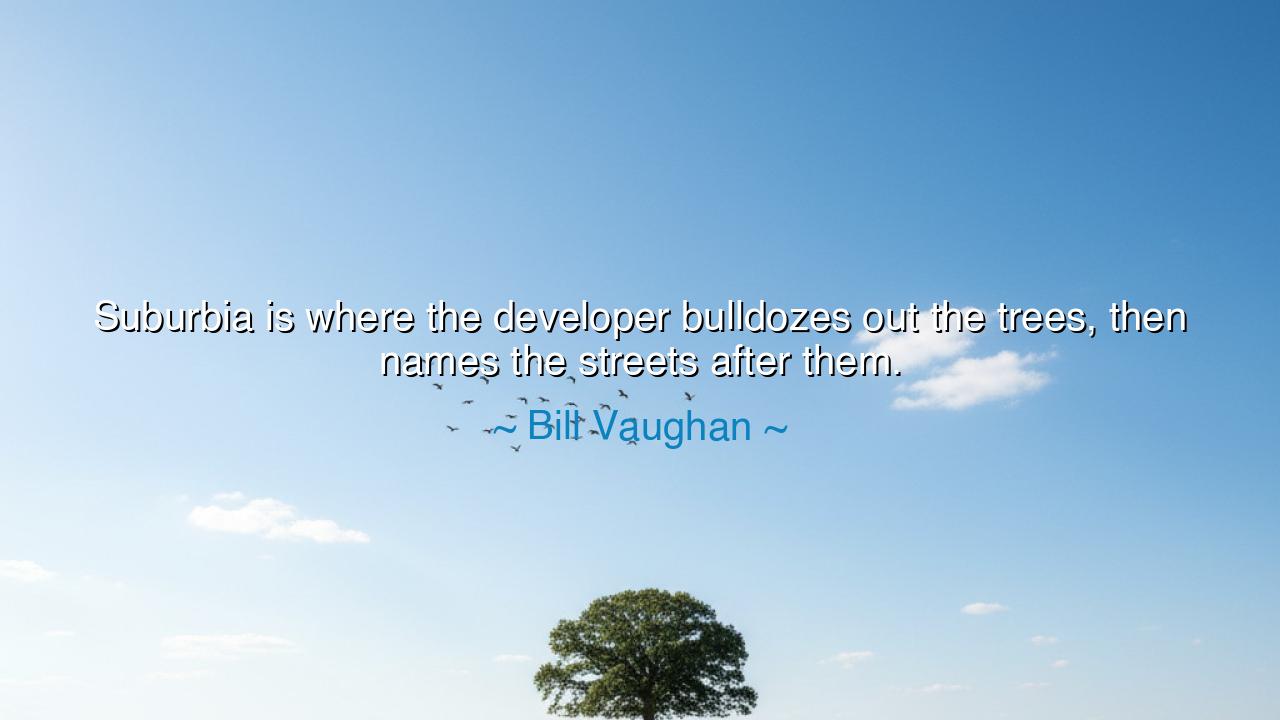
Suburbia is where the developer bulldozes out the trees, then
Suburbia is where the developer bulldozes out the trees, then names the streets after them.






O children of the earth, hear the words of a sage who observed the folly of those who build not with the wisdom of the past, but with the haste and carelessness of the present. Bill Vaughan once said: "Suburbia is where the developer bulldozes out the trees, then names the streets after them." This seemingly simple observation carries a profound truth about the nature of human progress and the cost it often exacts on the world around us. It speaks of a society that has become so focused on the growth of material wealth and comfort, that it has lost touch with the sacredness of the land it was built upon.
In the time of the ancients, there was a deep understanding that the earth was not just something to be conquered or tamed, but something to be respected and honored. The Greek philosophers, for example, believed that nature held wisdom, that the beauty of the world was a reflection of a divine order that should not be disrupted without great care. The ancient Romans, too, understood that their empire was built not just on conquest, but on a deep relationship with the land, the fields, and the forests that sustained them. The earth was not just a resource—it was a partner in the great work of civilization.
Yet, in our time, we have forgotten this sacred relationship. The story of suburbia is one of displacement—the destruction of the natural world in pursuit of comfort, convenience, and profit. The developer, in Vaughan’s words, bulldozes the trees, the living guardians of the land, and replaces them with houses, streets, and the trappings of modern life. But then, in a bitter twist, the very trees that were destroyed are commemorated, their names placed on the very streets that now obscure their existence. It is as if to say: “Though we have destroyed you, we will remember you in name, while we continue to shape the world in our own image.” The irony of this act is both painful and revealing.
Look to the example of ancient Egypt, where the people saw their land as a gift from the gods, to be protected and nurtured. The Nile, their lifeblood, was treated with reverence, and the landscape was tended to with great care. The Egyptians did not simply conquer nature; they worked in harmony with it, ensuring that their actions did not disrupt the balance of the world. Even their buildings, though magnificent, were built with respect for the landscape, blending with the natural environment rather than overriding it. In contrast, the development of suburbia reflects a disregard for this ancient wisdom—a rush to create, to build, to pave over the land without regard for the future.
What Vaughan’s words remind us of is the cost of this unchecked progress—the disconnection between humanity and the earth. The suburbs, with their neatly manicured lawns and orderly rows of houses, are an illusion of progress, a façade that hides the damage done to the world around us. The trees that once stood as silent witnesses to the cycles of nature are now mere memories, their names placed on streets as if to atone for their destruction. Yet, naming streets after trees is not enough to undo the harm done, just as paying homage to a lost tradition cannot bring back what has been lost.
The lesson here, my children, is a call to reflection. We must ask ourselves: what kind of progress are we truly pursuing? Is it a progress that enriches the soul, that honors the world around us, or is it a progress that only feeds our desires and ambitions, leaving destruction in its wake? True progress lies not in the eradication of the natural world to make way for convenience, but in the integration of human life with the land. The great societies of the past knew that their power was not built solely on human ingenuity, but on their ability to live in harmony with the earth.
And so, dear ones, let us consider our place in this world. Let us not be blinded by the allure of modernity, which promises comfort at the expense of the earth’s treasures. As we move forward, let us remember the lessons of the ancients, who understood that true prosperity comes not from the exploitation of nature, but from its preservation. Let us be the stewards of the land, not the destroyers of it. Let us plant the seeds for future generations, not only of buildings, but of trees, of wisdom, and of balance. And let us remember: the name of a tree on a street sign is no substitute for the tree itself.






AAdministratorAdministrator
Welcome, honored guests. Please leave a comment, we will respond soon